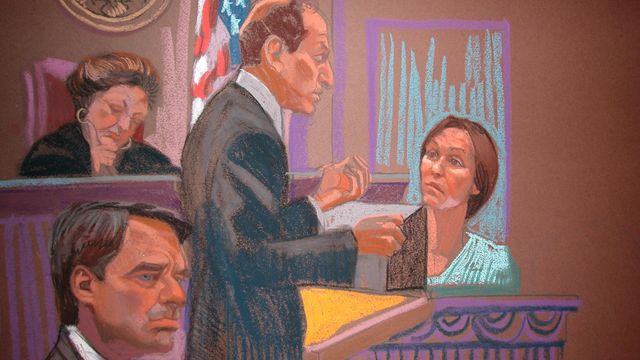Defense shifts focus of Edwards case to campaign finance law
After three weeks of tabloid-style testimony of illicit affairs, secret payments and an elaborate cover-up, John Edwards' criminal trial shifted Monday to the comparatively dry topic of campaign finance law as the defense began presenting its case.
Posted — UpdatedU.S. District Judge Catherine Eagles delivered a serious blow to the defense, however, in disallowing testimony from a former Federal Elections Commission chairman who has said that money given by two wealthy donors to Edwards' campaign weren't campaign contributions.
Edwards is accused of masterminding a scheme to use nearly $1 million in secret payments from Virginia heiress Rachel "Bunny" Mellon and Texas trial lawyer Fred Baron to help hide his pregnant mistress, Rielle Hunter, as he sought the Democratic presidential nomination in 2008. He faces up to 30 years in prison if convicted on all six counts.
Scott Thomas, who has worked on election law for 37 years and spent a number of years on the FEC, said Mellon and Baron both had long-standing relationships with Edwards and would have given him money even if he wasn't running for president.
"These are intensely personal-type expenses," Thomas said. "These payments stem from some other type of context than a campaign."
Thomas testified after Eagles sent the jury home for the day so she could rule on whether to allow the defense to use him as an expert witness.
Defense attorney Abbe Lowell argued that Thomas could help the jury sort through complex federal elections laws and determine whether it was reasonable for Edwards or any of his campaign staff to view the payments from Mellon and Baron as campaign contributions.
David Harbach, a U.S. Department of Justice attorney prosecuting the case, argued that Thomas would be interpreting the law for the jury, which he said is a job reserved for Eagles.
The judge agreed with Harbach, saying that the case "doesn't seem that complicated to me" and worrying that Thomas' testimony would conflict with her jury instructions at the end of the case.
"He made a pretty good closing argument for the defense," she said after hearing Thomas testify.
Earlier Monday, Lora Haggard, who served as chief financial officer for Edwards' 2008 campaign, said that she never included Mellon's or Baron's money in any campaign finance reports filed with the FEC because she didn't consider them to be campaign contributions.
"They were not used to urge the public to vote for John Edwards," Haggard testified.
Prosecutors have maintained that the money from Mellon and Baron helped keep Hunter quiet and away from the media during the early stages of the campaign and as Edwards angled for a top position in the future administration of President Barack Obama after dropping out of the race.
Haggard also said that including the contributions also would have required noting the related expenditures on a finance report, which would have violated federal law since campaign contributions aren't allowed to be used for personal expenses, such as prenatal care.
Edwards had no input on the finance reports, she said, and FEC auditors never asked her to amend the reports to include the money from Mellon and Baron, even after Edwards was indicted last summer, Haggard said.
An FEC audit of the campaign, which was required because Edwards accepted federal campaign matching funds, was finally completed last month, she said.
Eagles wouldn't let Haggard testify that the FEC determined last July that the money from the two donors wasn't a campaign contribution. Jeffrey Tsai, another U.S. Department of Justice attorney prosecuting the case, argued outside the jury's presence that the stance stated by one FEC commissioner during an agency meeting was irrelevant to the criminal case.
To prove Edwards guilty, prosecutors must show that he not only knew about the money used in the cover-up, which he denies, but also that the former trial lawyer and U.S. senator knew he was violating the law.
Also Monday, veteran pollster Harrison Hickman, who was a strategist for the Edwards campaign, said that he believed Baron supplied money to Hunter and former Edwards aide Andrew Young out of the goodness of his heart and that Edwards was unaware of it.
Young testified early on in the trial that Edwards asked him to claim to be the father of Hunter's child to squelch media speculation about the candidate having an affair. Baron then paid for Young's family and Hunter to be flown around the country and put up in posh resorts to keep the media away.
"He wanted to help them get away until this whole thing died down," Hickman said, adding that Baron was "persnickety" about bending rules and never would have violated campaign finance law.
• Credits
Copyright 2024 by Capitol Broadcasting Company. All rights reserved. This material may not be published, broadcast, rewritten or redistributed.






